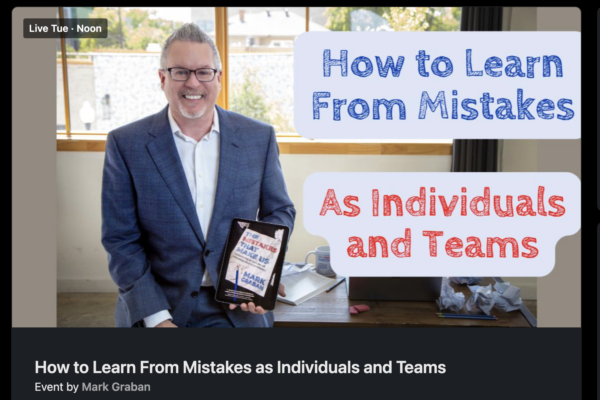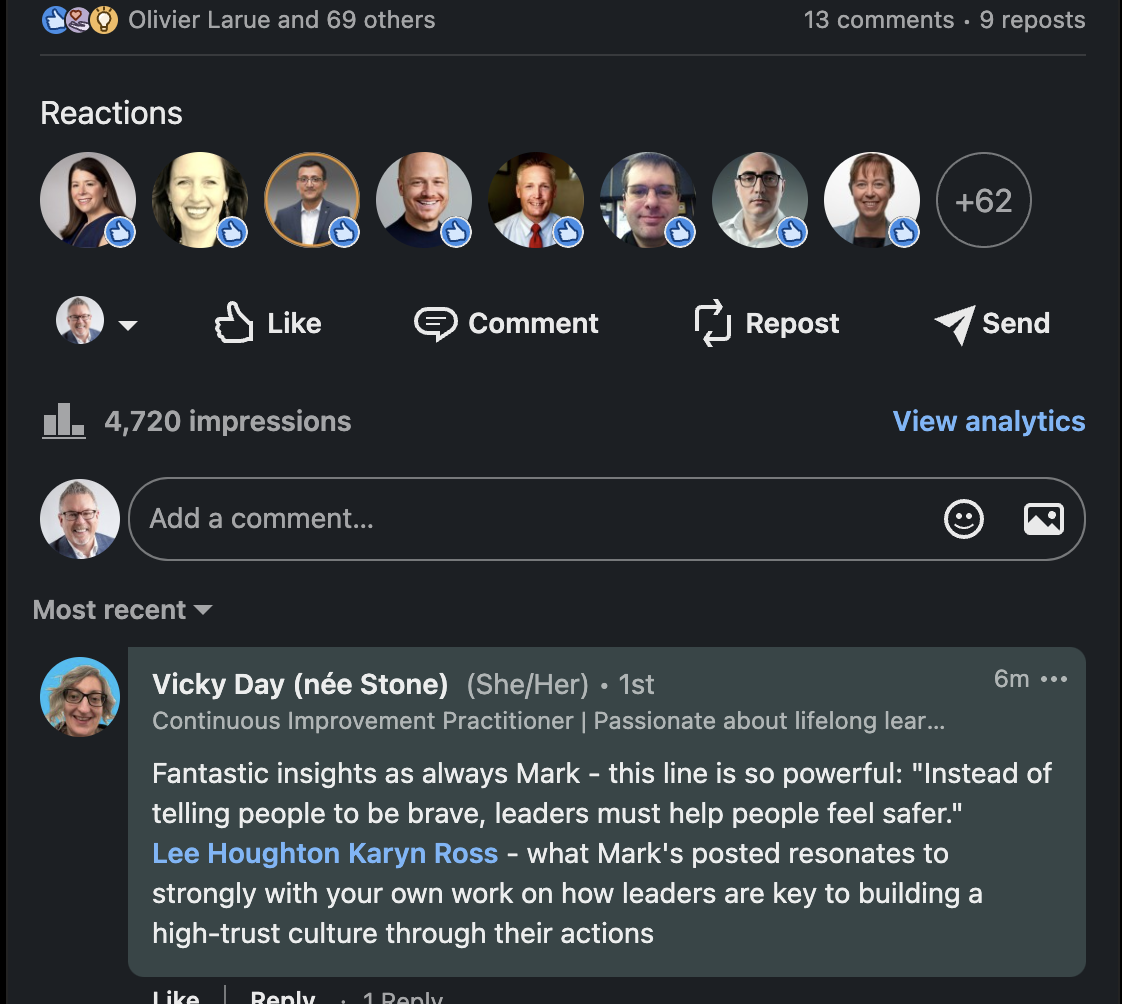A quick announcement before today's post… please join me tomorrow, October 3rd for a LinkedIn Live session at 1 pm ET.
How to Learn From Mistakes as Individuals and Teams
I'll be presenting for about 15 minutes and I'll take your questions in this interactive session.

Now, onto today's post…
Leaders and organizations have a choice:
1) cultivate a culture of fear and punishment or
2) a culture of learning and innovation.
That choice significantly affects happiness and performance at all levels within the organization.
A culture of fear and punishment drives mistakes underground. An organization with a culture of fear cannot learn from mistakes because people don't feel safe admitting them.
People who do admit mistakes to their manager aren't more virtuous or courageous; they likely are in circumstances where they are able to feel safe doing so. Instead of telling people to be brave, leaders must help people feel safer.
Those who fail to learn from mistakes are doomed to repeat them.
A culture of learning from mistakes is kind and constructive. It's more effective. It allows people to take an active role in preventing mistakes from being repeated. In doing so, they learn how to reduce the number made over time. They feel safer and more capable of driving improvement and innovation.
Hear Mark read this post — subscribe to Lean Blog Audio
Most organizations today are closer to a culture of fear and punishment than a culture of learning–it's been the corporate culture default for a long time.
Choosing to be positive and constructive about mistakes can be a differentiating competitive advantage. It will help you attract and retain top talent, and more effectively serve customers. More learning leads to more innovation, growth, and better long-term business performance.
This post included an excerpt from my book, The Mistakes That Make Us: Cultivating a Culture of Learning and Innovation — please learn more and consider buying the book via my website, Amazon, or other retailers in paperback, hardcover, Kindle, or audiobook formats. It's available now through Apple Books and coming soon to other eBook platforms.
Website –> https://mistakesbook.com/
If you'd like to read more about learning from mistakes, please follow me on LinkedIn, Mark Graban.
Join the conversation about this post on Linkedin or leave a comment below here on the blog.

Please scroll down (or click) to post a comment. Connect with me on LinkedIn.
Let’s work together to build a culture of continuous improvement and psychological safety. If you're a leader looking to create lasting change—not just projects—I help organizations:
- Engage people at all levels in sustainable improvement
- Shift from fear of mistakes to learning from them
- Apply Lean thinking in practical, people-centered ways
Interested in coaching or a keynote talk? Let’s start a conversation.





![When Was the Last Time a Leader Around You Admitted They Were Wrong? [Poll]](https://www.leanblog.org/wp-content/uploads/2025/07/Lean-Blog-Post-Cover-Image-2025-07-01T212509.843-238x178.jpg)


![When Was the Last Time a Leader Around You Admitted They Were Wrong? [Poll]](https://www.leanblog.org/wp-content/uploads/2025/07/Lean-Blog-Post-Cover-Image-2025-07-01T212509.843-100x75.jpg)

Hi Mark,
I enjoyed reading your post as a student embarking on the beginning of my professional journey. I cannot directly relate to culture of fear and punishment in the workplace, but as a student-athlete I have seen instances like it while playing baseball, some of my teammates are afraid to make mistakes and get reprimanded for it rather than getting coached up and improving upon them. There is no question that there are people who would rather hide their mistakes rather than own up to it and reach out for help.
As a person who is accountable and work with a positive and optimistic attitude, what should I do if I run into a leader in the workplace with more of a culture of fear and punishment like you discussed?
Hi Alex — I hope you can avoid being in a situation with a leader like that.
I hope you have an opportunity, when interviewing for positions, to ask questions about the leadership style in that workplace.
“Tell me about a time when an employee made a mistake… and how you and organization handled it…”
I believe it is valuable to make mistakes with anything you do. Being able to learn from your own mistakes is sometimes what it takes to be successful. In many areas of my life I have experienced a culture of creating fear and punishment for making certain choices, whether that is in the classroom, at work, or playing sports. I have found when I work in culture where it is okay to make mistakes and learn from them that I have been more successful and productive, as I don’t have the unneeded pressure and the thought of if I make a mistake there will be repercussions.
I really thought that you brought up interesting statements about learning from mistakes and as an individual and even when you are working with teams. When you said that leaders should promote a culture of fear I thought that it was very important because it showed a sense of humanity. I think that by doing that it could create a lot of havoc in the workplace. Having a culture of learning and innovation really determines the company associates happiness and performance. I personally think that these tools can make or break a company and you bring up key terms that can really show what a company can do to help to strive for success. Your key term was “Those who fail to learn from mistakes are doomed to repeat them.” I was really moved by this quote because I personally think as failing as lessons and I think that when you do make a mistake or do something wrong that if you are not learning from it then you aren’t bettering yourself.